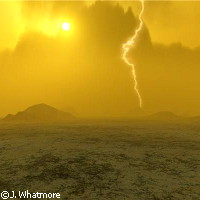Was young Venus ever habitable?
Nowadays, Venus looks like our idea of Hell: temperatures 2 or 3 times that of a kitchen oven, a noxious atmosphere and surface pressures about 100 times that on Earth - and therefore very little water. However, in the past, the planet may have been much more similar to our Earth, and may even have had oceans. Four years into the European mission Venus Express, leading space scientists are unlocking the mystery of this planet. Venus is the Earth's nearest planetary neighbour. Its size and mass are comparable to that of our planet, and it was formed at a similar time and from similar materials. Yet, Venus looks completely different now. 'Understanding the evolution of Venus should help us understand not only the evolution of the Earth but perhaps even planetary systems (outside our solar system) as well,' said Dr Colin Wilson from Oxford University in the UK. The European Space Agency (ESA) launched its Venus Express mission to unravel the mysteries of the little planet in November 2005. Arriving in April 2006, the satellite has been examining Venus for four years now. 'Venus Express continues to provide a rich source of data and information', and this year's conference (in Aussois, France in June) helped reveal some of the most interesting findings yet, according to Venus Express project scientist Håkan Svedhem. Venus Express has provided researchers with a full picture of the planet's structure, composition and dynamics, plus never-seen-before images from the Venus Monitoring Camera. 'The basic composition of Venus and Earth is very similar,' explained Dr Svedhem, except water is abundant on Earth, and virtually absent on Venus. Yet, Venus probably had much more water billions of years ago, and Venus Express data confirmed that the planet lost a large quantity of water into space to ultraviolet radiation from the Sun. 'Everything points to there being large amounts of water on Venus in the past,' Dr Wilson pointed out. But that does not necessarily mean there were oceans on Venus. Dr Eric Chassefière, planet scientist at the Université Paris-Sud in France, has developed a computer model that suggests the water was mostly in the planet's atmosphere, not on its surface, and that it existed only during the very earliest times of Venus. It is difficult to test this hypothesis. Dr Chassefière believes that more modelling, together with future data from Venus Express, will help planet scientists understand the evolution of the planet. In the past, both Russia and the US sent spacecraft to our neighbour; space scientists then put Venus on the backburner for about a decade, until the launch of new exploratory endeavours. The next missions will provide more data and help unlock the mysteries of Venus. In particular, the Japanese mission Akatsuki should reach Venus in December 2010. It will observe the planet from a different orbit and provide complementary information to that brought by Venus Express.



